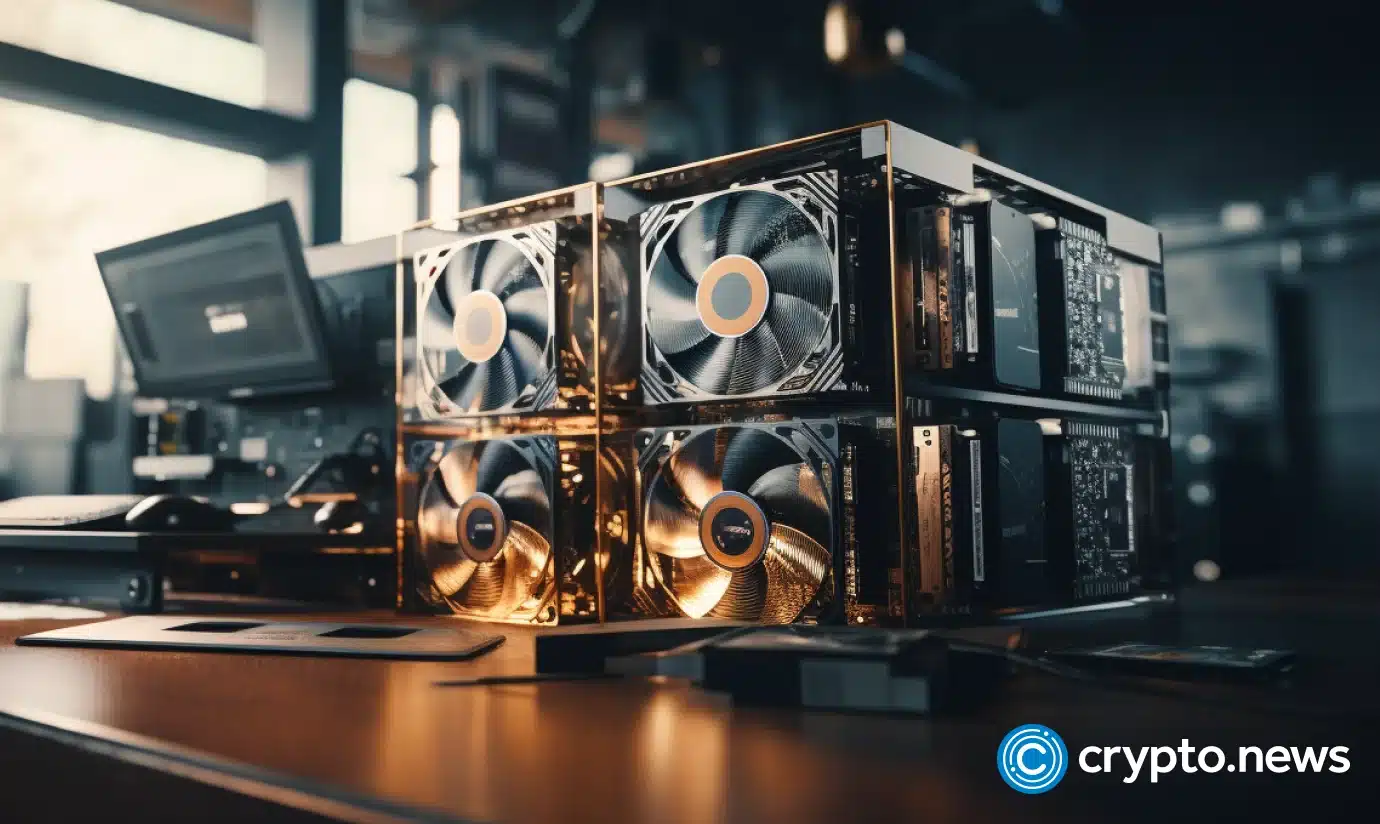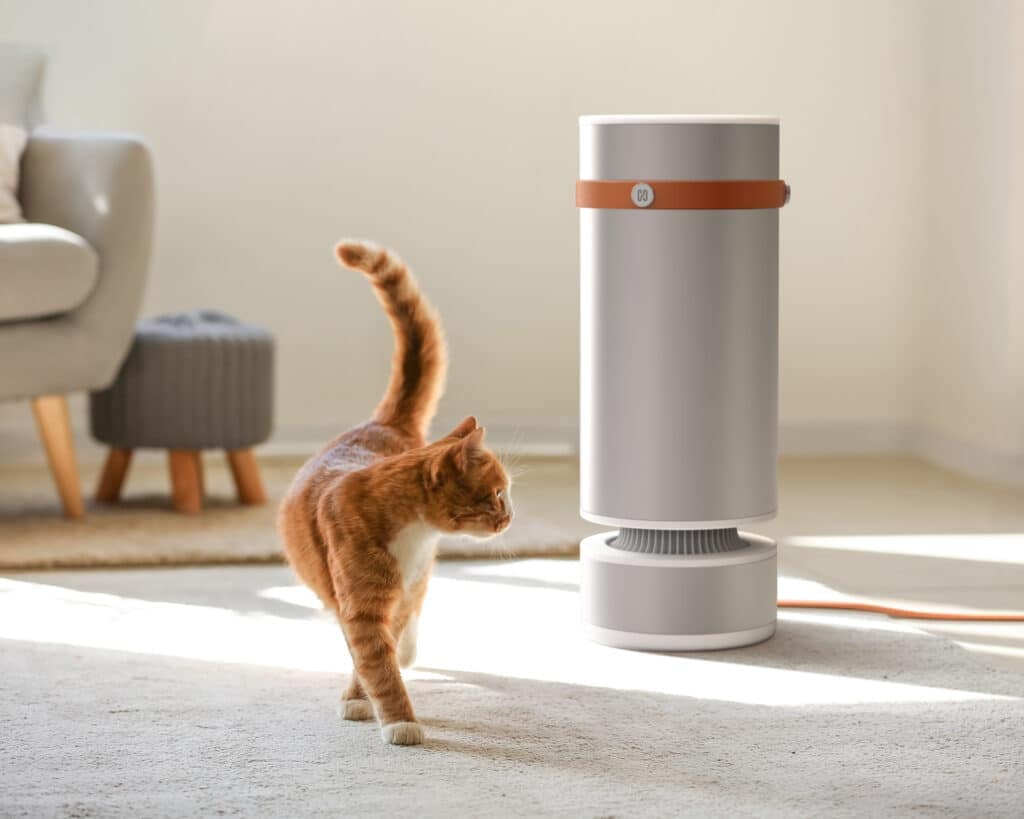A startup has developed a home heater that mines Bitcoin

Heatbit presented a new device combining a Bitcoin miner with a heater. Crypto.news talked with its developer during the Web Summit in Lisbon.
An individual Bitcoin transaction is estimated to consume around 710 kWh, equivalent to more than 20 days’ worth of electricity for an average American household. To put this into perspective, the average cost per kWh in the U.S. is around 17 cents, resulting in a substantial energy bill of approximately $120 for a single Bitcoin transaction.
Heatbit, a startup, has taken a rather inconvenient approach to alleviating the steep costs linked with Bitcoin mining: combining a Bitcoin miner with a heater. Led by Alex Busarov, an LSE graduate and former McKinsey employee, the company presented its creation at the Web Summit in Lisbon, an event attended by crypto.news. Presented as the world’s first heater-purifier, it not only warms homes but also claims to add an additional $15 to monthly savings.
The Heatbit Mini employs silicon chips that conduct complex computations, including Bitcoin mining and AI model training, supposedly generating monetary rewards while maintaining energy consumption comparable to standard appliances.
The device claims a 10 TH/s mining capacity at 400W energy consumption, with an added 1000W conventional heating boost for exceptionally cold days.
Crypto.news engaged in a discussion with Alex Busarov during the Web Summit. We delved into how the idea might have originated from Satoshi himself, explored the device’s functionalities, and discussed the future of Bitcoin mining.
Crypto.news: How did you come up with this idea?
Alex Busarov: I’ve been living in China for the last decade, and it all began during my time there. I was in Shanghai at the start of 2020 when COVID emerged in China, and we were already under lockdown. Days turned monotonous, and I was confined at home. That’s when I purchased a Bitcoin miner, the Antminer S9K, more of a toy than a money-making endeavor. I turned it on in my bedroom. First, it got really loud. Then it got really hot. It struck me then: it could be good heat if you solve the noise problem. So that’s how it started.
Then, we started researching. Our quest led us to Reddit, where numerous posts discussed repurposing Bitcoin miners as heaters.
If you look at it, there’s a post on Bitcoin Talk by Satoshi discussing how mining would likely transition to where it’s needed for heating. So, Satoshi envisioned it. People were doing it already, it confirmed that there was a need. However, doing this at home posed significant barriers. You need to understand how it works. You need to have the time to do it. You need to not worry about things like safety or things like insurance on your house. Because if you have a device like that, insurance won’t work.
We tried different ideas and ended up with Heatbit One. That was more like a proof-of-concept product. We made loads of mistakes with it and tried to fix them as much as possible. But we’ve proven that there is a demand. We’ve learned to understand our users. And at the end of last year, we started to build the proper product that would last for much longer.
Crypto.news: Could you explain how it works?
Alex Busarov: We encourage users to utilize it primarily as a heater. When people question its usability during summer, our answer is normally, “You don’t use a heater in summer.” Addressing their financial considerations about purchasing the product, we encourage them not to waste energy during warmer months.
Inside, you have the Bitcoin miner providing the base load. Even when minimal heating is required, it’s readily available. However, it’s not the full capacity; making it so would demand a significant number of chips, leading to higher costs. We incorporated a standard heater on top for when additional heat is needed. Utilizing the base capacity from the chips would suffice in places like Spain. On particularly cold days, when more heat is needed, the usual heater inside can be activated. While it doesn’t provide any extra mining or rewards, it offers additional heat when required.
Moreover, a common issue in residential environments involves dust and debris accumulating in radiators, obstructing airflow. Our solution involves incorporating a filter, effectively transforming the device into an air purifier. This addresses concerns during summer; essentially, it functions as an air purifier that doesn’t engage in mining.

Crypto.news: Can it work as an air conditioner as well?
Alex Busarov: Not yet. This device will only function as a heater and air purifier. However, we’ve already devised a method to construct an air conditioner. We’ve patented it for now and commenced work on the MVP. I believe we’ll have an MVP, not just a prototype, by spring. Perhaps by next year around that time, we’ll launch the air conditioner.
Crypto.news: How much revenue can it generate?
Alex Busarov: Speaking about this particular version, it’s 10 TH/s. That equates to about 60,000 satoshis per month if used for Bitcoin-only heating 24/7. 60,000 satoshi translates to roughly $22 monthly. So essentially, that’s the user’s yield.
The common comparison often revolves around differing electricity rates. Some challenge the device, stating that it generates fewer rewards than the energy it consumes. Our response is take, for instance, a Dyson, which costs the same, consumes the same power, yet generates zero. It’s more about the additional value gained versus the null return from standard heating.
Crypto.news: Interesting. But considering the Bitcoin mining difficulty, does it still make sense?
Alex Busarov: Yes. Bitcoin mining difficulty affects everyone. And it all becomes about the efficiency of the miners. Efficiency comprises two elements. Firstly, it’s the quality of the hardware used and how advanced the hardware is. Secondly, it’s your electricity price.
Now, concerning the hardware, these chips are highly efficient—five-nanometer chips, the latest generation—comparable to some of the best miners available. Regarding the cost of electricity, consider this: you’re already utilizing this electricity for heating. Therefore, the amount of electricity used by this generator equates to zero additional cost. In that regard, this is actually the most cost-effective way to mine. There’s no extra electricity expense involved.
What occurs in a scenario where the mining difficulty rises, and simultaneously the price of Bitcoin drops significantly? The large-scale professional miners will have to power down their machines because it won’t remain economically viable. However, those who mine in this manner, utilizing it as a heater but still want to keep mining, can do so. In that context, it’s actually the most efficient and cost-effective method of mining.
Crypto.news: Let’s talk about broader things: Bitcoin has long been perceived as a threat to the environment, consuming as much energy as an entire country. However, recent discussions suggest Bitcoin is becoming more environmentally friendly. What’s your opinion on this?
Alex Busarov: Bitcoin is here to stay, and the energy it consumes is spent on mining, impacting the environment. Whether it’s a considerable amount of energy or not, it is indeed significant. Is it worth it? I personally believe in Bitcoin’s fairness as money, and the cost incurred is a choice made by people, governed by the market.
As for Bitcoin mining becoming greener, there are varying arguments. One presented by the Bitcoin Mining Council claims that a significant percentage, 60% or 80%, of Bitcoin mining utilizes green energy. However, I find this argument flawed.
Green energy typically has the lowest marginal cost; once a solar or wind power plant is operational, it generates energy based on availability, such as wind or sunlight, without additional effort. So, if unused by Bitcoin mining, this energy would still enter the grid, displacing more expensive, often fossil fuel-based energy. Whether Bitcoin mining employs renewable or non-renewable energy, it doesn’t significantly alter this energy’s use. Some exceptions exist, such as energy sources not connected to the grid, like flare gas, albeit in smaller quantities. The majority of the claimed 60-80% renewable energy for Bitcoin mining, I believe, primarily comes from hydro, being the cheapest and the focus of mining operations. However, hydro could serve other human needs.
On the contrary, combining Bitcoin mining with heating, as we do or as DIY enthusiasts do, results in no additional energy usage. In this context, it stands as the greenest approach, simultaneously being the most cost-effective by avoiding extra energy consumption.















